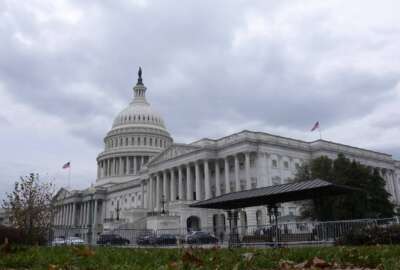
The 2024 budget request comes out this week, kicking off a new Congressional season
A really busy and contentious time for Congress kicks off this week when the Biden Administration releases its 2024 budget request. But that's not all.
A really busy and contentious time for Congress kicks off this week when the Biden Administration releases its 2024 budget request. But that’s not all. To get the latest on what is happening on Capitol Hill, the Federal Drive with Tom Temin talked with Bloomberg Government Deputy News Director Loren Duggan.
Interview transcript:
Tom Temin I want to start with a hearing that is coming up, because we just heard from the acting chairman of the Merit Systems Protection Board, Cathy Harris. And I asked her, as we heard moments ago, what it would take to get her acting off her title. And it turns out reconfirmation from the Senate. And that’s happening this week, that hearing?
Loren Duggan Right, That’s starting with the Senate Homeland Security Committee, I think voting on her nomination this week to send that to the full Senate. She was nominated last year, by the Biden administration and was confirmed to be a member of the board. But her nomination to be chairman was lingered throughout the end of the year and had to be returned and re nominated when the Congress met again this year. So it’s kind of perfunctory. It’s a step that you have to go through. But she needs that confirmation, as she told you, to actually get that chairmanship and lose that acting title. So that’s one of the many nominations that the Senate is trying to process, both, on the executive side and on the judicial side as well, with all the district and circuit court judges that they hope to fill.
Tom Temin Right. And one of the members of the Merit Systems Protection Board, his term ended a couple of weeks ago. But there’s no nomination to succeed Tristan Leavitt and make a three member board again, that we were aware of..
Loren Duggan Right. And I believe that’s been one of the problems, is that board lacked the quorum for a long time. They got it last year, but they still need the chairmanship filled. So I’m sure they’re working behind the scenes on those nominations as they do. But to my knowledge, there isn’t a pick yet for that.
Tom Temin Yeah, be interesting what it’s like to be chairman of two people, I guess. But somehow, they figure out how to get through it in a day’s work. And let’s get back to the budget here, that’s the big drop, thud coming in a couple of days. And what does that cause in Congress? And we all hear that term, dead on arrival. But it’s a starting point of discussion, I think is a more creative way to put it.
Loren Duggan Yeah, it is. It’s dead on arrival in some ways, but not in others. I would think if you look at the [Department of Defense (DoD)] portion of the budget, for example. That is really a starting point where the way that Congress approaches that is really a give and take from what the administration wants, possibly lifting up the amount of money that the administration sends up and asking for more. At least that’s been the trend in some of the recent budget debates. But on the non-defense side, the Biden administration is likely to ask for much more money than House Republicans, in particular, are going to want to spend. Because this budget release does come amid the discussions, that are not really a debate yet, but really behind the scenes discussions on what to do with the debt limit, and what to attach with any sort of debt limit solution to appease House Republicans. Now, of course, the Biden administration would prefer just to lift the debt ceiling to give themselves the cushion they need to continue to operate the government. But at this point, we’re still probably going to have a lot of back and forth over the coming months. But it does kick off a process, is an important document. There are a lot of details in it, but it’s only a starting point and Congress has a lot to say, and they’ll be saying it over the next several months.
Tom Temin Right. And the idea of 12 separate appropriations bills, at least in the House, maybe, and you can tell us about the Senate. It’s a revival of a great dream of regular order. And Washington is getting very cynical about this whole idea of continuing resolutions and omnibus bills and attaching all kinds of things to the omnibus bills, because they have to pass. Any words yet, any kind of shoots of fresh thinking on regular order.
Loren Duggan Well, the House certainly, the Republicans did not like the omnibus bill that came out last year. And I think that’s one of their prime talking points, even when we had that speaker debate at the beginning of the year when Kevin McCarthy was trying to win the speakership over that week. They don’t want a massive bill dropped on them at the last minute that contains all the funding for all the government agencies. They want to have regular order there. On the Senate side, we had this week or last week Susan Collins and Patty Murray, who are the new leaders of that committee. They released a schedule to try and get all of their bills out of committee starting in May. So a plan to do that is a really good starting point. We haven’t heard the timing yet from the House, although they have released year mark guidance, which are there rules for those special projects. So they’re starting up the engine here, on appropriations in both chambers to try and make progress. Now, there’s going to be two different visions from House Republicans and maybe a more bipartisan approach in the Senate that could make it hard to get to a resolution. But I think they’d like to avoid an omnibus if they could, that’s always an appropriators dream, because it’s easier to have up or down votes on individual bills rather than all the government funding at once.
Tom Temin And there is the idea that Congress actually looks individually at agency appropriation requests, and they used to talk about them with program people about their programs.
Loren Duggan Right. And I think that’s still happening at the staff level and even in the subcommittee level, where different agency heads are going to be brought up, both, the top cabinet officials. But, smaller portions and divisions of agencies will have to go up and justify what they’re asking for and there’ll be a give and take there. When you get to the fact that the bill, which is most members get to vote on, is one giant thing, that there’s really a reluctance to continue that practice among a lot of members.
Tom Temin We’re speaking with Loren Duggan, deputy news director at Bloomberg Government. And I wanted to ask you about this bill that would bar federal employees from censoring content on private social media. What’s that all about? It seems to coincide with the whole TikTok deal, which is not related, but kind of. It’s all social media and the poison around it.
Loren Duggan Right. And I think it’s also related to some of the hearings that House Republicans have had about social media, and some of what they said went on with the Hunter Biden laptop story back in the day. So it’s part of this theme. And the idea here is that it would, specifically bar federal employees from censoring speech on private platforms. Lawful speech, obviously, if it’s criminal or something like that, or that would not be covered by this. But it is one of the big tech bills that they’re going to move. There’s kind of a shift away from big tech antitrust actions, to looking at these censorship questions as they are. So this bill is very much of that theme. It was approved by the Oversight and Accountability Committee last week, coming up on the floor this week. So we’ll see what that debate looks like and how people respond. But I think this is part of the story that House Republicans really want to tell and talk about, as they continue some of their oversight work, and obviously, even with legislation like this.
Tom Temin Interesting. Yeah. And related to issues that don’t seem directly federal. This criminal code change in D.C., that’s a surprise that this would get through the Democratic Senate. We know how the House feels on it. And then the president said, yeah, that seemed shocking.
Loren Duggan Yeah, it snowballed over time. Because the House, as you noted, brought up a piece of legislation, which under the D.C. Home Rule Act, which created the D.C. Council, and instead of the local government that exists now. Congress reserved the right to review, and in some cases, overturn DC laws. The House passed two bills, one dealing with noncitizen voting, the other dealing with this package of changes to the criminal code. And I think it was 31 Democrats in the House, supported this. Went over to the Senate. The vote was anticipated when the time came and Democrats have said they’re going to back it, some of them. I think there will still be votes against it, just as there were in the House. But it likely will pass and go over to President Biden, who at one point said he wouldn’t veto it, then came out and said he’d sign it, which is kind of a surprise. It does pit two different things, concern about crime versus the self-governance of the District of Columbia. And you’ve seen a lot of discussion about that, I think, from Eleanor Holmes Norton, the delegate here, and others who really wish Congress would stay out of DC business. But as I said, the law that created the government did reserve this right to Congress.
Tom Temin And earlier, a couple of weeks ago, we talked about the Fair Act with that 8.7% federal employee pay raise. A couple of things like that. And what you hear the senators saying is, yeah, great idea this and a few others, but it’s going to be in September. It still seems like there’s this pushing back of these important, but regular old fashioned legislative type of ideas, being pushed back to late in the first session of this Congress. That’s still the case?
Loren Duggan It feels like that sometimes. The last week really felt like Congress really stepped on the gas, in terms of, holding a lot of hearings and taking more votes and and starting to get the mechanisms of Congress up and running. So I think we are going to see more votes on more bills, whether it’s the Senate Foreign Relations Committee looking at the Iraq war authorizations from, in some cases, decades ago and trying to change that, or turning through more nominations. So we are seeing more activity happening on more thing. Were going to, obviously, when the budget request hits Capitol Hill, that’ll kick off the budget season. So I do think things are starting to move more quickly, but individual items may slip till later in the agenda as they figure out which to prioritize. And each chairman has their right to set their agenda in the order they want. And a lot of ways.
Tom Temin And just a final detail question. There could be a Senate panel that’s having a hearing on the train derailment. What can they really accomplish? The train should not derail. Nobody thinks they should.
Loren Duggan Well, there are some bipartisan bills already introduced, and maybe some partisan ones as well. So Congress likes to do things when they can. So there are some ideas that are out there. There’s even proposals to help the community of East Palestine, Ohio, with maybe a paycheck protection program style program. So I think we’ll hear a lot of discussion about how to respond. The thing that might be interesting about this hearing is, it’s a chance for senators to question the CEO of Norfolk Southern, the railroad that operates the train that derailed. So I think this is just the beginning of discussions around rail. But, you probably see Congress want to do something about it, put its mark on the question as the year goes on.
Copyright © 2024 Federal News Network. All rights reserved. This website is not intended for users located within the European Economic Area.
Tom Temin is host of the Federal Drive and has been providing insight on federal technology and management issues for more than 30 years.
Follow @tteminWFED





